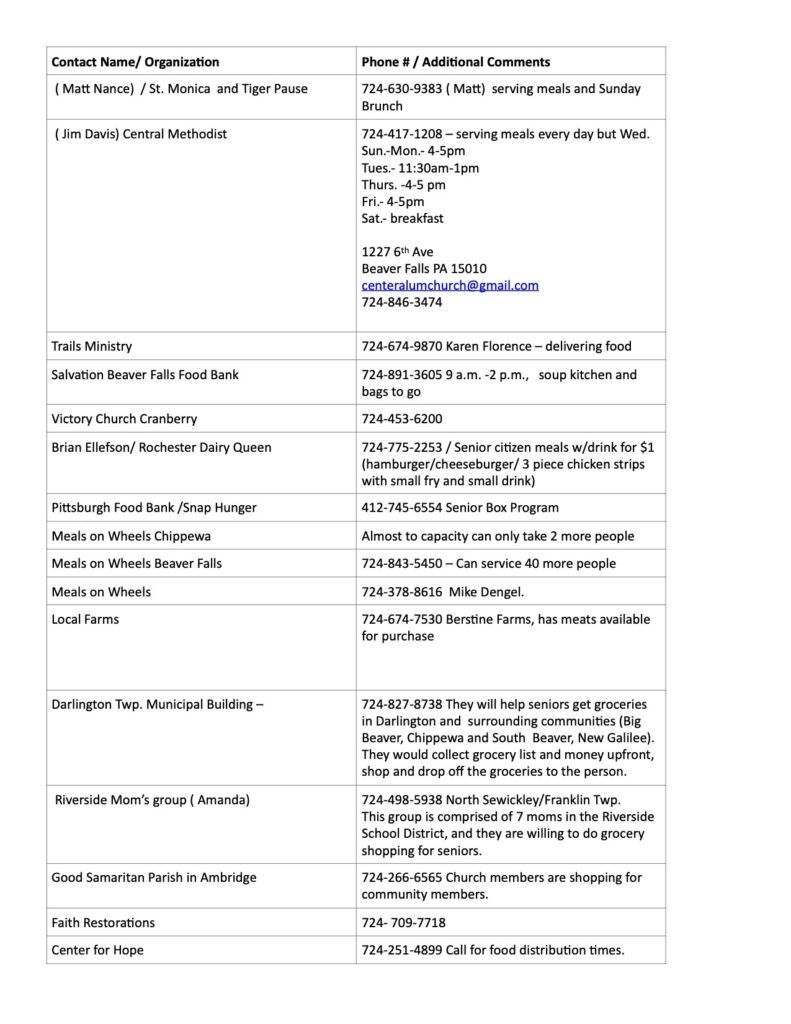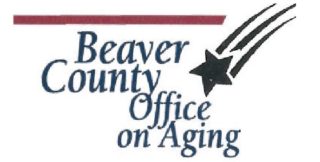Beaver County Office on Aging COVID-19 Task Force Newsletter Volume 1 April 1, 2020
An important message from the Beaver County Office on Aging
For the safety of our staff and consumers, the Beaver County Office on Aging is working from home and will be providing full services via phone, email or postal mail. If you need to reach us or have a question about our services, please leave a message that includes your name, phone number, brief description of your needs, and whom you are trying to contact. We are checking our messages during our normal business hours of Monday – Friday from 8 a.m.- 4:30 p.m. A staff member will return your call by the end of the next business day. Please call (724) 847-2262 or (888) 548-2262, TDD (724) 728-5700 if you need assistance or know anyone who may need guidance during this time.
Care Managers still are here to assist with needs in your home regarding services. Home Delivered Meals are still being provided from our Senior Center. If you need meals, call our office.
We are able to complete assessments (via phone interview) for enrollment into Community Health Choices Program (Waiver), continue offering Apprise (insurance counseling) and support via the phone, internet and postal mail.
If you feel an older adult is being abused, neglected, or exploited, call Older Adult Protective Services at 724-775-1786. The hotline is open 24 hours a day. Thank you for your patience and understanding during this time.
Q&A Stimulus Checks: Who is eligible?
Q. Who is eligible to receive a payment from the federal government?
A. All U.S. residents who are not a dependent of another taxpayer, have a work eligible social security number and do not exceed approved income caps.
Q. How much money will I receive?
A. This depends on the size of your family. The payment is $1,200 for each adult ($2,400 for joint filers) and $500 per child under the age of 17. However, high earners will receive less: this payment will be reduced by $5 for every $100 of adjusted gross income joint filers made over $150,000; $112,500 for a head of household filer; and $75,000 for everyone else, including single filers.
Q. When, and how, will I get my direct cash payment?
A. As quickly as possible – likely, in the coming weeks. Treasury Secretary Mnuchin said during a March 25 White House briefing that the department could begin sending payments in as few as three weeks. The Internal Revenue System (IRS) will determine payment delivery systems for everyone entitled to rebates. Rebates will be delivered automatically, by the IRS, to most Americans who file individual federal income tax returns. Payment processing will be based on payment or address information already on file with the IRS. Rebates sent via direct deposit will take a few weeks. Rebates sent via check will take longer. The Social Security Administration will share information for Social Security (Old-Age, Survivors and Disability Insurance) beneficiaries with the IRS to help ensure these beneficiaries receive their automatic advance payment. The IRS will also conduct a public awareness campaign to reach other non-filers and provide them with information on how they can access rebates. We will continue updating our website to reflect that information.
Q. Will I get a rebate if I didn’t file taxes in 2018 or 2019?
A. If you do not owe the federal government taxes for either 2018 or 2019 and usually don’t file as a result – you should file this year to ensure you can receive your payment.
Q. Are retired senior citizens living on a fixed Social Security income eligible for the direct cash payments?
A. Yes. Any American who meets the requirements laid out above – whether their income comes from their job or social security payments – is eligible.
Information from Rep. Conor Lamb website
SOCIAL SECURITY SCAM ALERT
The Social Security Office of the Inspector General has received reports that Social Security beneficiaries have received letters through the U.S. Mail stating their payments will be suspended or discontinued unless they call a phone number referenced in the letter. Scammers may then mislead beneficiaries into providing personal information or payment via retail gift cards, wire transfers, internet currency, or by mailing cash, to maintain regular benefit payments during this period of COVID-19 office closures.
FACT: Social Security will not suspend or decrease Social Security benefit payments or Supplemental Security Income payments due to the current COVID-19 pandemic. Any communication you receive that says Social Security will do so is a scam, whether you receive it by letter, text, email, or phone call. If you receive a letter, text, call or email that you believe to be suspicious, about an alleged problem with your Social Security number, account, or payments, hang up or do not respond.
This information is from the Social Security Administration website
Avoid Coronavirus Scams
The Federal Trade Commission has some tips to help you keep the scammers at bay:
● Hang up on robocalls. Don’t press any numbers. Scammers are using illegal robocalls to pitch everything from scam Coronavirus treatments to work-at-home schemes. The recording might say that pressing a number will let you speak to a live operator or remove you from their call list, but it might lead to more robocalls, instead.
● Ignore online offers for vaccinations and home test kits. Scammers are trying to get you to buy products that aren’t proven to treat or prevent the Coronavirus disease 2019 (COVID-19) — online or in stores. At this time, there also are no FDA-authorized home test kits for the Coronavirus. Visit the FDA to learn more.
● Fact-check information. Scammers, and sometimes well-meaning people, share information that hasn’t been verified. Before you pass on any messages, contact trusted sources. Visit What the U.S. Government is Doing for links to federal, state and local government agencies.
● Know who you’re buying from. Online sellers may claim to have in-demand products, like cleaning, household, and health and medical supplies when, in fact, they don’t.
● Don’t respond to texts and emails about checks from the government. The details are still being worked out. Anyone who tells you they can get you the money now is a scammer.
● Don’t click on links from sources you don’t know. They could download viruses onto your computer or device.
● Watch for emails claiming to be from the Centers for Disease Control and Prevention (CDC) or experts saying they have information about the virus. For the most up-to-date information about the Coronavirus, visit the Centers for Disease Control and Prevention (CDC) and the World Health Organization (WHO).
● Do your homework when it comes to donations, whether through charities or crowdfunding sites. Don’t let anyone rush you into making a donation. If someone wants donations in cash, by gift card, or by wiring money, don’t do it.
PLANNING FOR THE FUTURE
The Beaver County Office on Aging is developing its Four Year Plan 2020-2024 which is used as a management tool to guide with decisions regarding the budget, staffing, services and programs for older adults in our county. To develop the plan, we need your input and opinions. Tell us what Beaver County older adults age 60 and over will need in the next four years. Please fill out the Beaver County Office on Aging Needs Assessment Survey for Older Adults-2020 by clicking on this link. We also ask if you would help older family members and neighbors complete this survey online.
https://www.surveymonkey.com/r/Beaver2020
2020 CENSUS
It is time to respond to the 2020 Census. The United States Census counts every person living in the 50 states, District of Columbia and five U.S. territories. This time around, you have some choices on how to answer those questions, by mail, by phone or online through a computer or mobile device.
As of mid-March, you should have received an invitation by mail from the Census on how you would like to respond. The Census did send a paper questionnaire to some households with the first invitation in March. You may respond online in English or in 12 additional languages. There also is a video in American Sign Language to guide you through responding online. You can respond by telephone in English or 12 additional languages. There will be an option to respond in English through TDD. By-mid April, the Census will mail a paper questionnaire to every household that has not already responded. There will be braille and large print guides available online to assist you in completing the paper questionnaire.
If you have not responded in any way by mid-May, a Census taker will visit your home so you can respond in person. The time table for Census taker visits are being delayed due to the COVID-19 crisis. You are required by law to complete the 2020 Census if you live in the United States.
The Census will ask the following: how many people are living or staying at your home April 1, 2020; whether the home is owned or rented; about the sex of each person in your home; about the age of each person in your home; about the race of each person in your home; about whether a person in your home is of Hispanic, Latino or Spanish origin; about the relationship of each person in your home.
Your personal information is kept confidential, and the Census Bureau is bound by federal law to protect everyone’s information. Your data is used for statistical purposes. The Census results help determine how billions of dollars in federal funding flow into states and communities. The results also determine how many seats in Congress each state receives. Beside this, governments, businesses, communities and non-profits use the data to help them make critical decisions about programming and development.
Please be mindful as there could be someone trying to scam people during the Census. The Census will never ask anyone for their Social Security number, money or donations, bank or credit account numbers. If anyone asks you for this information, it is a scam and do not cooperate. www.2020census.gov
PENNSYLVANIA COUNCIL ON AGING COVID-19 SURVEY
The Pennsylvania Council on Aging is conducting a statewide survey in order to assess what the immediate needs and capabilities are of older adults due to COVID-19.
The goal is to collect and share this information in order to: better understand the immediate needs of older Pennsylvanians; determine how to best reach older adults during this time; assess the particular vulnerabilities of older adults during this pandemic; create meaningful solutions to the current challenges facing older adults.
The survey can be filled out here: https://form.jotform.com/200854578445059
The survey will be open until April 7. It is for adults age 60 and over in Pennsylvania. The Pennsylvania Council on Aging is a cohort of volunteers who work on behalf of older adults across the commonwealth. Established in 1977, we are required, to prepare and submit to the Governor, the General Assembly, the Secretary of the Department of Aging and the public, reports evaluating the level and quality of services and programs provided to the aging by Commonwealth agencies together with recommendations for improved, expanded or additional programs and services for the aging.
FOOD ASSISTANCE


